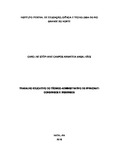Trabalho educativo do técnico-administrativo do IFRN/CNAT: consensos e dissensos

Data
2016-05-23Autor
Magalhães, Caroline Stephanie
http://lattes.cnpq.br/3220911491341837
Metadado
Mostrar registro completoResumo
The ontological, creative and historical conception of work is not reducible to the labor activity, but it is the production of all the dimensions of human life. Work is the pivotal point between the object of this research, the educational work of the technical and administrative realm and education. Educational policies interfere with the school environment and the educational practices of their workers. In this perspective, this research investigates if the work of the technical and administrative personnel of the Federal Institute of Education, Science and Technology of Rio Grande do Norte (IFRN), Natal Central Campus (CNAT), includes the educational dimension, focusing on the 2005-2015 period. In order to unveil the reality, the theoretical background was structured on a historical-critical perspective and a documental, bibliographical-qualitative research was conceived. At first, work was discussed in the capitalist mode of production, and its educational dimension. Then the history of the technical and administrative personnel’s work dialogued with the historical and legal landmarks of the professional education. In addition, the correlation of forces in the political realm of the school context was presented and, finally, the institutional legal documents, and the speeches of the technicians and managers from IFRN/CNAT were analyzed. The results point to the action of the State in the process of alienation and fragmentation of the working class education, according to the logic of centrality and periphery to education. It is in empiricism that the design of technical and administrative work was constructed historically peripheral to education, linked to bureaucratic, administrative and control; presence of conflicts of interest among workers in education, activities as well as to the controlling ones; conflicts of interests were observed among the educational workers, intensified by the asymmetries of the educational public policies. Since reality is understood as essentially contradictory, with and without consensus in a political realm of antagonistic interests, it was concluded that this reality can contribute to the dialogue and to the search of an educational practice, as long as we consider that educational work transcends the classroom and that it is necessary for the whole human formation of the student.



